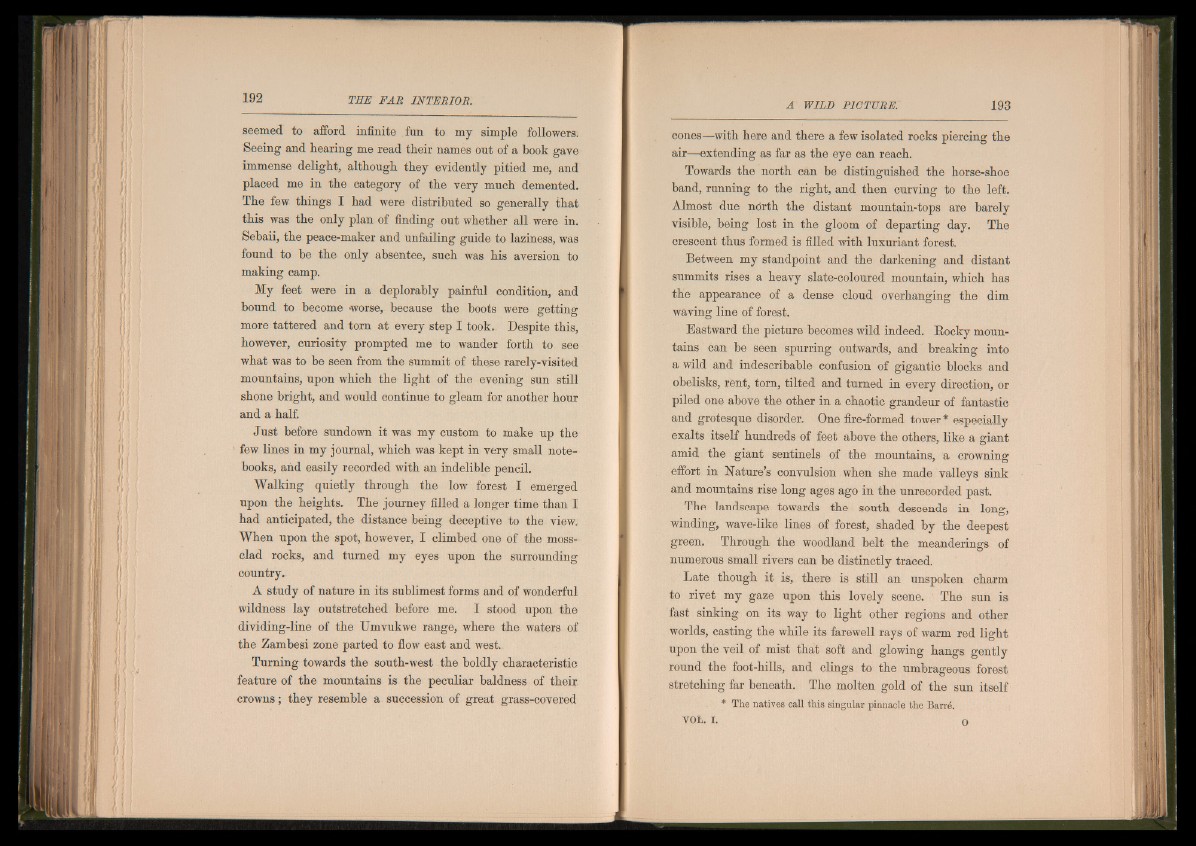
seemed to afford infinite fun to my simple followers.
Seeing and hearing me read their names out of a book gave
immense delight, although they evidently pitied me, and
placed me in the category of the very much demented.
The few things I had were distributed so generally that
this was the only plan of finding out whether all were in.
Sebaii, the peace-maker and unfailing guide to laziness, was
found to be the only absentee, such was his aversion to
making camp.
My feet were in a deplorably painful condition, and
bound to become «worse, because the boots were getting
more tattered and torn at every step I took. Despite this,
however, curiosity prompted me to wander forth to see
what was to be seen from the summit of these rarely-visited
mountains, upon which the light of the evening sun still
shone bright, and would continue to gleam for another hour
and a half.
Just before sundown it was my custom to make up the
few lines in my journal, which was kept in very small notebooks,
and easily recorded with an indelible pencil.
Walking quietly through the low forest I emerged
upon the heights. The journey filled a longer time than I
had anticipated, the distance being deceptive to the view.
When upon the spot, however, I climbed one of the moss-
clad rocks, and turned my eyes upon the surrounding
country.
A study of nature in its sublimest forms and of wonderful
wildness lay outstretched before me. I stood upon the
dividing-line of the Umvukwe range, where the waters of
the Zambesi zone parted to flow east and west.
Turning towards the south-west the boldly characteristic
feature of the mountains is the peculiar baldness of their
crowns; they resemble a succession of great grass-covered
cones—with here and there a few isolated rocks piercing the
air—extending as far as the eye can reach.
Towards the north can be distinguished the horse-shoe
band, running to the right, and then curving to the left.
Almost due north the distant mountain-tops are barely
visible, being lost in the gloom of departing day. The
crescent thus formed is filled with luxuriant forest.
Between my standpoint and the darkening and distant
summits rises a heavy slate-coloured mountain, which has
the appearance of a dense cloud overhanging the dim
waving line of forest.
Eastward the picture becomes wild indeed. Eocky mountains
can be seen spurring outwards, and breaking into
a wild and indescribable confusion of gigantic blocks and
obelisks, rent, torn, tilted and turned in every direction, or
piled one above the other in a chaotic grandeur of fantastic
and grotesque disorder. One fire-formed tower* especially
exalts itself hundreds of feet above the others, like a giant
amid the giant sentinels of the mountains, a crowning
effort in Nature’s convulsion when she made valleys «ink
and mountains rise long ages ago in the unrecorded past.
The landscape towards the south descends in long,
winding, wave-like lines of forest, shaded by the deepest
green. Through the woodland belt the meanderings of
numerous small rivers can be distinctly traced.
Late though it is, there is still an unspoken charm
to rivet my gaze upon this lovely scene. The sun is
fast sinking on its way to light other regions and other
worlds, casting the while its farewell rays of warm red light
upon the veil of mist that soft and glowing hangs gently
round the foot-hills, and clings to the umbrageous forest
stretching far beneath. The molten gold of the sun itself
* The natives call this singular pinnacle the Barré.
VOL. I. o